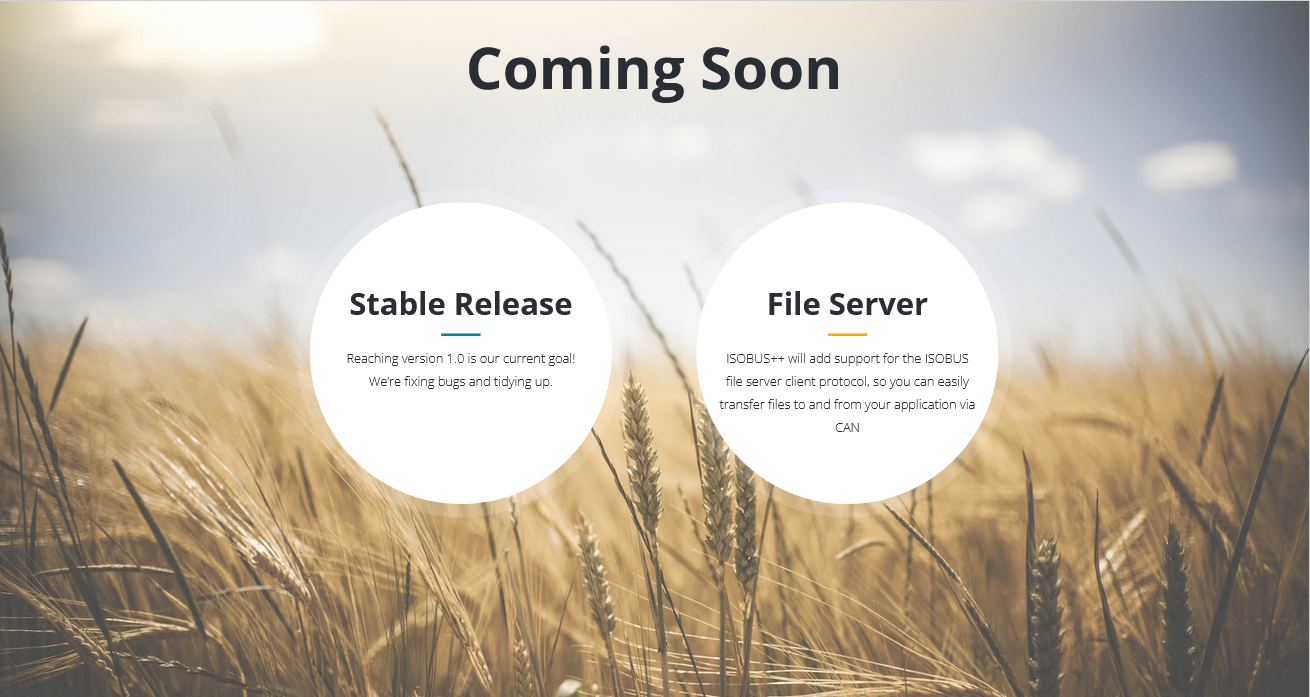AgIsoStack++ (Formerly Isobus++) is an MIT licensed hardware agnostic ISOBUS (ISO11783) and SAE J1939 CAN stack written in C++.
The library transparently supports the entire ISOBUS/J1939 transport layer, automatic address claiming, and many of the high level ISOBUS protocols, such as:
- Task Controller Client
- Virtual Terminal Client (aka Universal Terminal)
- ISOBUS Diagnostic Protocols
- NMEA 2000 Fast Packet
Check out the tutorial website for information on ISOBUS basics, how to download this library, and how to use it. The tutorials contain in-depth examples and explanations to help get your ISOBUS or J1939 project going quickly.
This library is compiled with CMake.
cmake -S . -B build
cmake --build build
A default CAN driver plug-in will be selected for you based on your OS, but when compiling you can explicitly choose to use one of the natively supported CAN drivers by supplying the CAN_DRIVER variable.
-DCAN_DRIVER=SocketCANWill compile with Socket CAN support (This is the default for Linux)-DCAN_DRIVER=WindowsPCANBasicWill compile with windows support for the PEAK PCAN drivers (This is the default for Windows)-DCAN_DRIVER=MacCANPCANWill compile with support for the MacCAN PEAK PCAN driver (This is the default for Mac OS)-DCAN_DRIVER=TWAIWill compile with support for the ESP TWAI driver-DCAN_DRIVER=MCP2515Will compile with support for the MCP2515 CAN controller
Or specify multiple using a semicolon separated list: -DCAN_DRIVER="<driver1>;<driver2>"
If your target hardware is not listed above, you can easily integrate your own hardware by implementing a few simple functions.
There are build in examples. By default, examples are not built. The easiest way to build them is from the top level.
cmake -S . -B build -DBUILD_EXAMPLES=ON
cmake --build build
Tests are run with GTest. They can be invoked through ctest. Once the library is compiled, navigate to the build directory to run tests.
cmake -S . -B build -DBUILD_TESTING=ON -DCAN_DRIVER=SocketCAN
cmake --build build
cd build
ctest
You can integrate this library into your own project with CMake if you want. Adding it as a submodule to your project is one of the easier ways to integrate it today.
Make sure you have cmake installed:
Ubuntu
sudo apt install cmake
RHEL
sudo dnf install cmake
Then, submodule the repository into your project:
git submodule add https://github.com/ad3154/ISO11783-CAN-Stack.git <destination_folder>
git submodule update --init --recursive
Then, if you're using cmake, make sure to add the submodule to your project, and link it.
It is recommended to use the ALIAS targets exposed, which all follow the name isobus::<target_name>.
find_package(Threads)
add_subdirectory(<path to this submodule>)
target_link_libraries(<your executable name> PRIVATE isobus::Isobus isobus::HardwareIntegration isobus::SocketCANInterface)
A full example CMakeLists.txt file can be found on the tutorial website.
You can also install the library if you want.
For a local install:
cmake --install build --prefix install
For a system-wide install:
sudo cmake --install build
Then, use a call to find_package() to find this package.
You can view the pre-compiled doxygen here https://delgrossoengineering.com/isobus-docs
You can also generate the doxygen documentation yourself by running the doxygen command inside this repo's folder.
Make sure you have the prerequisites installed:
Ubuntu:
sudo apt install doxygen graphviz
RHEL:
sudo subscription-manager repos --enable codeready-builder-for-rhel-9-$(arch)-rpms
sudo dnf install doxygen graphviz
Then, generate the docs:
doxygen doxyfile
The documentation will appear in the docs/html folder. Open index.html in a web browser to start browsing the docs.
This project's sponsors are a big part of making this project successful. Their support helps fund new hardware and software tools to test against, which drives up quality.
Thank you:
- Franz Höpfinger franz-ms-muc



